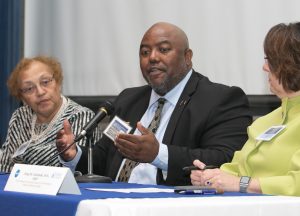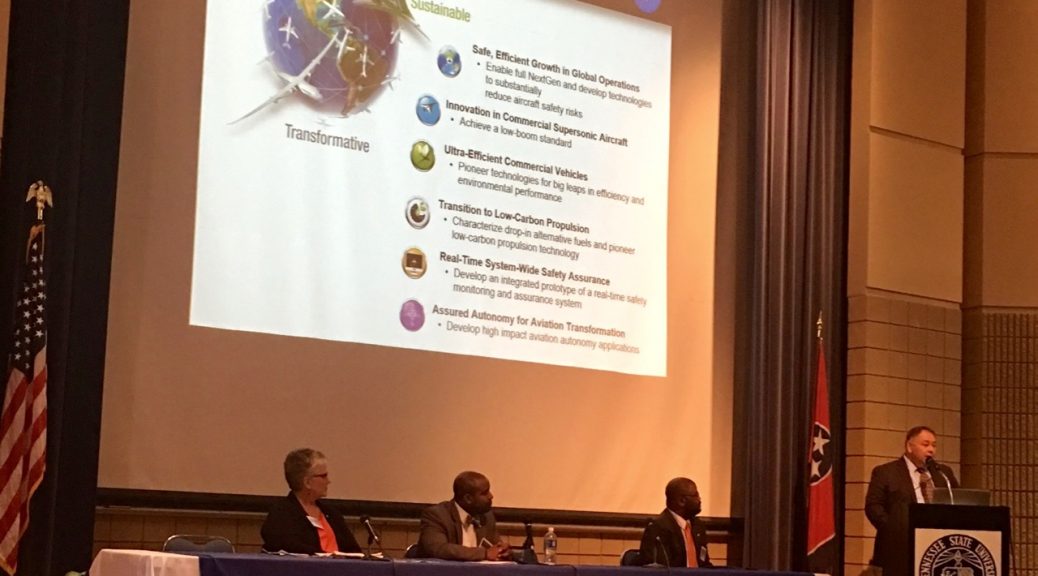NASHVILLE, Tenn. (TSU News Service) –Tennessee State University hosted a two-day workshop to provide HBCUs and minority-serving institutions a platform to seek research funding from NASA.

The NASA HBCU/MSI Technology Infusion Road Tour, on its third HBCU stop, is designed to strengthen research enterprise at historically black colleges and universities and minority serving institutions by providing opportunities for faculty and students to engage in significant research activities.
The tour is also designed to help NASA and large prime contractors meet and/or exceed the agency’s mandated HBCUs/MSI goals.
“We want HBCUs and minority-serving institutions to be actually involved with the next type of technology that will get us beyond earth or tomorrow,” said Dr. Joseph Grant, NASA’s deputy program executive for Small Business Innovation Research. “These technologies are going to be developed by minds of students like those here at TSU and all over the country.”
Grant said HBCUs have a unique way of looking at solving problems that are not always tapped into.
“So what we are trying to do is to bring all the voices to the table to help us solve some of the complex problems that we are going to have. I know what the expertise are, where they lie, how we look at things, and how we attack a problem,” he said.
TSU Associate Vice President for Administration, Dr. Curtis Johnson, in a welcome statement on behalf of President Glenda Glover, said the NASA tour brings “new knowledge and opportunities to TSU.”
“We thank NASA and all of these other agencies for bringing this road trip to TSU,” Johnson said. “We are counting on our faculty and staff to fully maximize the benefit of this opportunity.”
Dr. Lesia Crumpton-Young is TSU’s chief research officer and vice president of Research and Institutional Advancement. She said the NASA tour is “very critical” because HBCUs and MSIs have not had the opportunity to significantly participate in their share of federal funding.
“So this is going to teach them strategies on how to be successful in getting that funding,” Crumpton-Young said. “Our expectation is that through this tour and many other efforts, we are going to help strengthen the research enterprise, not only at TSU, but throughout the country.”
Before TSU, the NASA HBCU/MSI Technology Infusion Road Tour stopped at Tuskegee University and North Carolina Central University. The next stop is Jackson State University. Seven agencies and participants from 14 HBCUs attended the workshop at TSU, according to Crumpton-Young.
Tabisa Taliwaku Kalisa, program manager of the Office of Small Business Programs at NASA, said the agency wants to find ways to engage with more minority-serving institutions in its “industrial base.” She said NASA is not reaching its 1 percent goal of doing business with HBCUs and MSIs.
“We are having a hard time meeting those goals because most of our prime contractors cannot find schools that are capable of doing the work,” Kalisa said. “I truly believe that the schools are there, but we have to figure out the synergy to get those schools more engaged, to be able to know about opportunities, and be able to participate.”
Gwen Johnson is director of Small Business at Parsons, a prime contractor. She was part of a group of participants who toured research facilities and classrooms at TSU as part of the NASA visit, and was “very impressed.”
“I look forward to sharing this information with Parsons’ technical experts and connecting them specifically with the TSU Center of Excellence in Information Systems Research in areas of cyber security, data analytics and advanced control and identification systems,” she said.
Among other agencies and contractors at the workshop were the Defense Advanced Research Projects Agency, the National Institutes of Health, the Office of Personnel Management, the Small Business Administration, and the U.S. Department of Army.
“The event allowed faculty to expose their students to research at a higher level, to conferences, internships and maybe even a new career as many of the agencies and companies represented are looking to add new talent to the workforce,” said John Barfield, director of engagement and visibility in TSU’s Division of Research and Institutional Advancement.
Department of Media Relations
Tennessee State University
3500 John Merritt Boulevard
Nashville, Tennessee 37209
615.963.5331
About Tennessee State University
With more than 9,000 students, Tennessee State University is Nashville’s only public university, and is a comprehensive, urban, co-educational, land-grant university offering 38 undergraduate, 25 graduate and seven doctoral programs. TSU has earned a top 20 ranking for Historically Black Colleges and Universities according to U.S. News and World Report, and rated as one of the top universities in the country by Washington Monthly for social mobility, research and community service. Founded in 1912, Tennessee State University celebrated 100 years in Nashville during 2012. Visit the University online at tnstate.edu.
